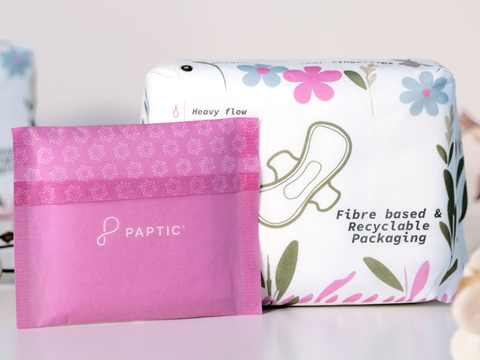
Paptic is packaging feminine care products with its recyclable, wood fibre-based material, seeking to deliver a ‘soft and pleasant’ user experience while reducing flexible plastic waste.
Paptic materials are designed for resource efficiency and can be recycled in the same streams as paper and cardboard. It is reported to comply with such legislation as the Packaging and Packaging Waste Regulation and the Single-Use Plastics Directive as a sustainability-minded alternative to plastics.
According to the company, Paptic materials are lightweight, heat-sealable, and can be processed on existing plastic converting lines, meaning that manufacturers can easily switch from conventional plastics without making further investments.
FSC-certified options are also available to customers, which is said to highlight Paptic’s commitment to responsible sourcing.
“We’ve developed a material that not only enhances sustainability but also elevates functional performance,” says Alexandros Skouras, Hygiene segment director at Paptic. “This solution seamlessly replaces traditional plastics, offering a renewable and recyclable alternative. It’s perfectly suited for personal care products, where comfort is a key priority.
“Our R&D efforts focus on developing recyclable wood fibre-based materials that help our customers reduce their dependence on plastics, while optimizing resource use both in materials and to enhance circularity, keeping materials in material use as many life cycles as possible.”
The collection of fibre-based packaging materials is said to be ‘well above’ 84% already, with all the fibre repurposed as a raw material for new fibre-based solutions. Paptic hopes that its own expansion into the hygiene and feminine care markets will provide a high-performance packaging alternative and cut down on plastic waste.
Similar endeavours from the feminine care industry include Procter & Gamble’s transition into FSC-certified, recyclable, paper-based packaging for its Always Cotton Protection Pad Range back in March 2023. An ISO Life Cycle Assessment claimed that the pack cut greenhouse gas emissions by over 60% compared to virgin fossil plastic bags across Europe.
More recently, it was announced that ProAmpac’s fibre-based ProActive Recyclable RP-1050 will be commercialized as overwrap for feminine care products, among other applications. The kerbside-recyclable solution will be available in natural kraft and bleached versions, with flexographic printing set to boost brand visibility and consumer engagement.
Searo Labs also foresees the use of its seaweed-based packaging in feminine care products, and has been working with PA Consulting to scale up and commercialize the packaging technology in order to counteract PFAS usage and plastic pollution.
In other news, Paptic has been nominated for a Sustainability Award under the Commercialized Renewable Materials category. The nomination centres around the application of its Paptic material to surface-sensitive items.
If you liked this story, you might also enjoy:
The ultimate guide to the Packaging and Packaging Waste Regulation in 2024
How are the top brands progressing on packaging sustainability?
Sustainable Innovation Report 2024: Current trends and future priorities
Everything you need to know about global plastic sustainability regulation














No comments yet